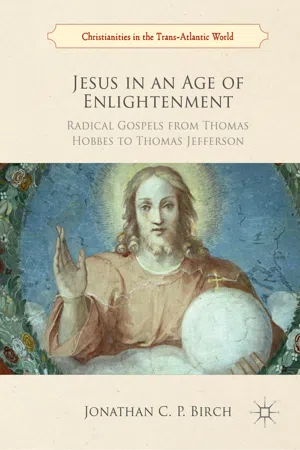Jesus in an Age of Cultural Plurality
When the controversial publisher and political activist Julian Assange quoted from the Gospel of Matthew , from his refuge in the Ecuadorian Embassy in London in 2014,1 he was utilising a familiar rhetorical option among modern public intellectuals. In his BBC Radio broadcast on the subject of surveillance culture and state secrecy, Assange warned national governments and global corporations that the human ‘desire to know’ was irrepressible, and that the ‘machinations of the powerful’ must be ‘dragged into the daylight’. Jesus was cast by Assange as ‘one of history’s great activists’ and quoted against those who wield power to limit the flow of information for their own ends: ‘There is nothing concealed that will not be disclosed, or hidden that will not be made known. What you have said in the dark will be heard in the daylight. And what you have whispered in the ear, in the inner rooms, will be proclaimed at last from rooftop to rooftop’.2
Assange was obviously not carrying out scholarly exegesis here, teasing out the meaning of a passage based on its literary, theological, or historical context, but then neither have most readers (or hearers) of biblical texts throughout the history of their reception. For two millennia, the figure of Jesus has been invoked as a source authority for sociopolitical as well as spiritual causes, with the Gospels treated as living resources with which to exercise or confront power . The secularisation of Western societies in the twentieth century, and the process of globalisation, has produced a bewildering range of images of Jesus to feed into public discourse: religious , secular , conservative , liberal , radical , and many combinations thereof.3 When did diversity begin to stretch the margins of Christianity to the point where interest in (even enthusiasm for) Jesus as a historical figure, moral authority, and cultural icon need no longer provide an assured indication of someone’s confessional orientation?4
Within the context of intellectual history, one period presents itself as a plausible source of this
pluralism . In his study of
Jesus in
modern American culture,
Stephen Prothero writes,
Beginning with the Enlightenment of the eighteenth century, skeptics in Europe and America started to chip away at the traditions of the Church, employing reason and experience to undermine confidence in the Bible and creeds. This assault on tradition might have killed Jesus, but it did not. On the contrary, it freed him up to be a hero to those who could not embrace the beliefs and practises of traditional Christianity .5
The exclusive focus on the eighteenth century here is misplaced. Since the Reformation Christian denominations have been multiplying with Churches and their representative theologians characterised by different ideas about the figure of Jesus : his nature and the essence of his teaching (Christology ), his salvific role (soteriology ), and his relationship to earthly powers (political theology). Moreover, the price that earlier individuals paid for unsettling ‘traditional Christianity ’ needs to be emphasised. When one considers the burning of Miguel Servetus in the sixteenth century,6 the hanging of Thomas Aikenhead in the seventeenth century,7 the imprisonment of J. L. Schmidt and Thomas Woolston in the early eighteenth century,8 and the conspiracy of silence and disinformation surrounding Hermann Samuel Reimarus , the author of the Wolfenbüttel Fragments in the high German Aufklärung ,9 it seems fair to say that expressing heterodox notions concerning Jesus, and Christian doctrine more generally, were among the most perilous things an intellectual could do during the early modern period. Nevertheless, Prothero is correct to identify the Enlightenment as a significant period for the development and proliferation of modern perspectives on Jesus which are not subservient to orthodox Christian theology ; indeed, this is something of a truism in scholarly discussions of the topic.10 Nevertheless, the impact of the Enlightenment on conceptions of Jesus and, no less important for this study, what such conceptions tell us about the Enlightenment , is typically acknowledged rather than investigated as a topic in its own right.
Historians are accustomed to dealing with a plurality of Enlightenments. It is now widely recognised that there were different traditions of intellectual, literary, and sociopolitical activity across Europe and North America in the seventeenth and eighteenth centuries, with (sometimes) conflicting views on the nature of human flourishing. And yet they all came with the promise of progressive illumination in the private and public domains of human life. I have no wish to challenge this growing consensus and attempt to restore hegemony; rather, I wish to develop and deepen the theme of pluralism through a study of what has been called the ‘religious Enlightenment ’.11 The canard that ‘the Enlightenment was profoundly anti-religious’ persists even today among authorities whose overall body of work suggests that they ought to know better.12 In this study, I shall be expanding the canon of writers included in this historiographical category of ‘religious Enlightenment ’, or Enlightenments, and blurring some of the imaginary borders erected between ages and intellectual traditions.13
